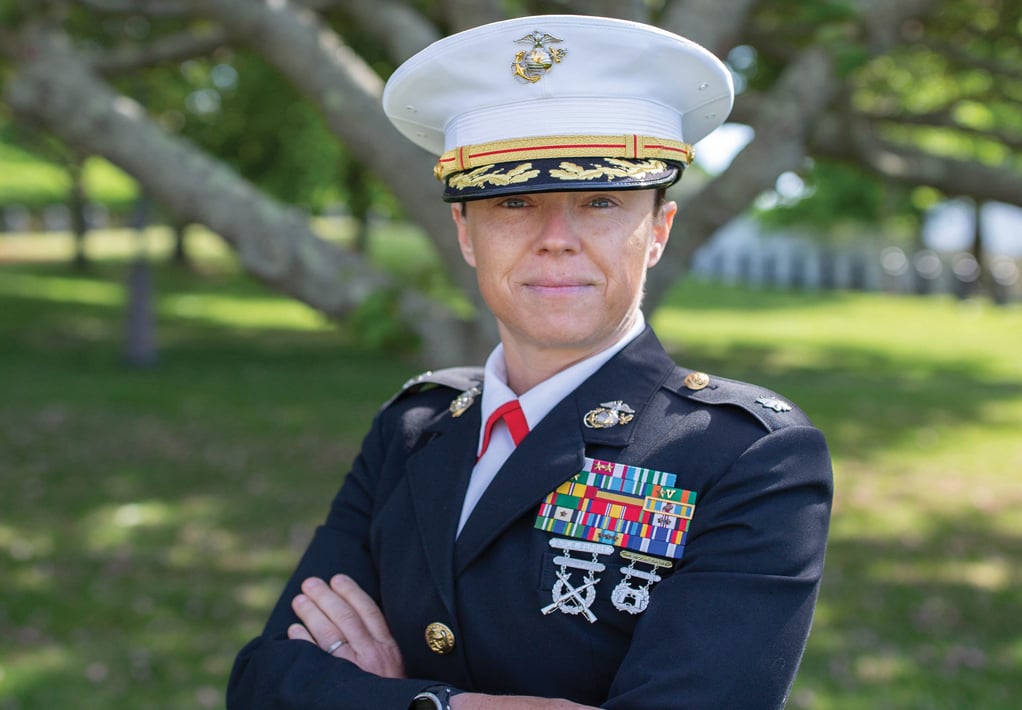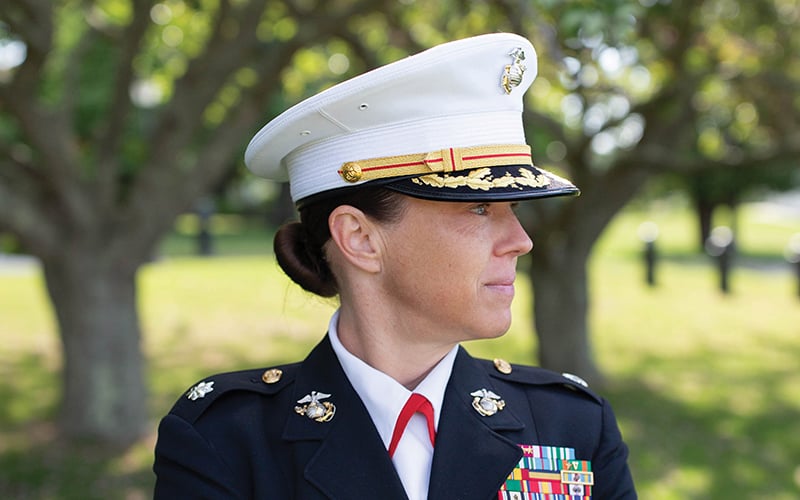Modern-Day History Maker
By: Kristin Baird Rattini | Categories: Alumni Achievements

Over the past two decades, Macander’s meritorious service at home and abroad as a combat engineer officer and in other roles has propelled her through the ranks of the Marine Corps at a time when the Corps itself was re-evaluating the role that women could play in combat. In 2018, Macander was the subject of more than a few press releases when she became the first woman commander of a Marine ground-combat battalion. This was not just any battalion: It was the 1st Combat Engineer Battalion, 1st Marine Division, the oldest, largest, and most decorated Marine division.
As she accepted the flag at her historic change-of-command ceremony in June 2018, “I felt mostly sheer excitement,” she says. “I didn’t know what was coming, but I was really proud to be able to be there.”
If The Fatigues Fit, Wear Them
Macander’s family has a proud history of military service. Her grandfather, an uncle, and her father all served in the Marines. “When I was a kid, I would sneak into my dad’s bedroom and try on his uniform because I thought it was cool,” she says.There was no pressure on Macander and her five siblings to carry on the military tradition, but she was intrigued by the prospect. In high school, she applied to the U.S. Military Academy at West Point, N.Y., just two hours south of her home in Clifton Park, N.Y., and toured the campus.
Looking for a more traditional college experience, Macander instead enrolled in the chemical engineering program at Georgia Tech. A standout runner in high school, she earned a walk-on spot for Tech’s cross-country and track teams as a freshman. As the year wound down, a fellow track team member suggested she consider joining Tech’s Navy ROTC program. “I was interested in the challenge of it,” she says. “The Marine Corps is the toughest service, and that appealed to me.”
That’s how she wound up in the office of then-Captain Aaron Potter. “My job was not only to train Marine officers but to recruit them,” Potter says. “Michelle was gift-wrapped; she just walked into my office. You can search high and low for someone like her and never find them. She had a stellar academic record and a presence of mind that you could see clearly the moment she walked in.”
A week later, Macander was in uniform and in formation. “The second I stood in formation on that first day of ROTC,” Macander says, “I knew I wanted to be a Marine Corps officer.”
Macander admits she needed some shaping. “I required a firm, steady hand, and that’s what Capt. Potter provided,” she says. Potter kept her moving when she struggled on hikes under heavy gear. When she switched her major from chemical engineering to international affairs, he applauded the move for the perspective it would give her on the Marines’ role on the global stage.
As she progressed to Officer Candidates School and then The Basic School, Macander had another Tech cheerleader keeping her company: Khalilah Thomas, her best friend from ROTC. “I joke that at The Basic School, she took my idea for a job,” says Thomas, now a lieutenant colonel in the Marine Corps’ Senate Liaison Office in Washington, D.C.
The job: combat engineer officer. It appealed to Macander immediately. “The easy way to describe the job is that I build things and blow things up,” she says. “I joke that I had this ball of C4 explosive in my hands, and the clouds parted and the sun beamed down on me and I saw my future. But the part that really appealed to me was the building part of it. The demolition part is fun for a few seconds. But seeing that something you built is still standing years later feels much better.”

Experience On The Ground
While she was in The Basic School, the attacks of 9/11 happened. “I remember thinking, ‘This fundamentally changes everything,’” she recalls. In 2003, as part of Operation Iraqi Freedom, she found herself in Tikrit, Iraq, supervising the repair of a bombed-out runway so that C-130 cargo planes could land safely. “I vividly remember standing on top of my Humvee and watching the first C-130 land and just holding my breath,” she says. “If anything bad happened, I was the one who certified it. It not only landed fine, but the pilot said it was one of the smoothest landings he’d ever had.”The repair work had been anything but smooth: Her crew came under enemy fire. “My training kicked in,” she says. “We made sure all of the Marines were out of their equipment and back in the bunkers we had just established to get them to safety.” The incident earned her the Combat Action Ribbon. It would not be the last time in her career that the reality Macander faced on the ground conflicted with the official Marine Corps position at the time that women could not serve in combat roles.
“When the tactical commander needs something, they’re not going to stop and say, ‘What is Congress’ opinion about whether this person is authorized to be here?’” Macander says. “They’re going to ask, ‘Where is the nearest engineering unit? Because we have something that needs to be done now.’”
In Kuwait, Macander met Lt. Col. Lauren Edwards, a Marine a step ahead on the career ladder who became a close friend and mentor. “Michelle is incredibly smart and talented,” Edwards says. “Watching her do some amazing things, especially things I was never allowed to do, is like being a big sister getting to be so proud of your little sister.”
After two overseas deployments, Macander next followed in Potter’s footsteps by serving as a Marine officer instructor at the University of Colorado in Boulder for three years. Her work there with undergraduates and enlisted Marines reignited her passion for the Corps. “It reminded me of why I wanted to join the Marine Corps in the first place,” she says.
She pivoted from teacher to student, spending a year at Expeditionary Warfare School to learn the higher-level planning skills necessary to manage large battalions as an operations officer. She soon implemented those skills in 2011 when she became operations officer of the 8th Engineer Support Battalion, which covered all of Helmand Province, the largest in Afghanistan and the focus of a military surge. She coordinated her battalion’s work on power generation and water purification and construction of roads and bridges, including one that had been damaged by the enemy and left Marines stranded on the other side.
As her Helmand deployment wrapped up, she was awarded the Meritorious Service Medal. “It was a lot of trial by fire when I first got there—a lot,” she says. “To leave there being told, ‘Job well done,’ was really important to me.”
Long-Overdue Changes
By the time Macander returned stateside in 2012, the military’s “Don’t Ask, Don’t Tell” policy had been rescinded. While stationed at Marine Corps Engineering School in North Carolina, she invited an important person in her life to the Marine ball: her girlfriend, Julie Brown, whom she’d met in Boulder and stayed on a “just friends” basis for several years. “That was kind of my coming out party for the Marine Corps,” she says. “At that point, I vowed I was never going to hide who I am.” When Macander returned to Expeditionary Warfare School as an instructor in 2014, the engaged couple moved to Quantico, Virginia, together. They married in May 2015.Other significant changes were taking place in the military around that time. In 2013, Defense Secretary Leon Panetta lifted the ban on servicewomen in combat, requiring all branches to implement the policy by January 2016. The Marine Corps appealed, but finally opened all positions to women in April 2016. “I thought, ‘It’s about time,’” Macander says. “You can tell me I’m too slow, too short, or not strong enough to do something. But you can’t say I can’t do it because I’m a woman. It’s just absurd.”
Positions that had long been off-limits were now open to Macander and the women coming up behind her in the ranks. In 2017, she submitted her name for commander of the 1st Combat Engineer Battalion. “She was the best choice,” Thomas says. “If the Marine Corps was going to do something intentional, to have a truly diverse force to maximize its talents, there was no other choice for them to pick.” Thomas was on hand when her best friend assumed command of 1st Combat Engineer Battalion and accepted the flag at the change-of-command ceremony at Camp Pendleton, California, in June 2018.
A Historic Command
Macander’s top priority in her historic posting was to ensure the combat readiness of the 1,300 Marines under her command. “I had to be ready at a moment’s notice to deploy the battalion,” she says. “I had to make sure the Marines are always mentally, physically, and emotionally prepared to do that.”In a typical week, she’d lead Marines on hikes, observe training sessions, frequently mentor the leadership team, and visit the maintenance shop that keeps the battalion’s heavy equipment in peak condition.
Every time she entered her office, she passed a line of 60-plus photographs of her predecessors, dating back to 1941. “I knew I had this legacy that I needed to uphold,” she says. “I had to live up to these gentlemen that were staring at me every day.”
Macander faced one enormous challenge, however, that those gentlemen never encountered: Covid-19. Her command was winding down as the pandemic was ramping up in spring 2020. “Other people can lock down and go offline, but the Marine Corps doesn’t have that option,” she says. “We had to be creative in how we went about our training.” Exercises took place in smaller groups. Marines were quarantined for two weeks in their barracks before deployment. There were zero reported cases in her battalion when she handed over the flag to her successor in June 2020.
Before leaving Camp Pendleton, she took a photo in front of her newly hung picture on the wall of past commanders. “It’s 60-something men, and then there’s me,” she says. “It represents my place in this history; I’m exceptionally proud to be a part of it.”
“Michelle is a real inspiration to many women in the Marine Corps,” Edwards says. “There are lots of people who, because of the things Michelle has done, can see themselves in the organization and what their next step can be.”
The picture of Macander’s next career step is still coming into focus. She just completed a year of strategic studies at the Naval War College and has started a military fellowship at the Center for Strategic and International Studies, a think tank in Washington, D.C. “I’ll be soaking up as much information as I can,” she says, “and getting some experience outside the typical Marine Corps path.”
She’ll have the voice of Lt. Col. Potter guiding her along the path. He, among many others, is eager to see where it leads. “There’s going to be a lot more from Michelle, I’m telling you,” he says. “She is going places.”


